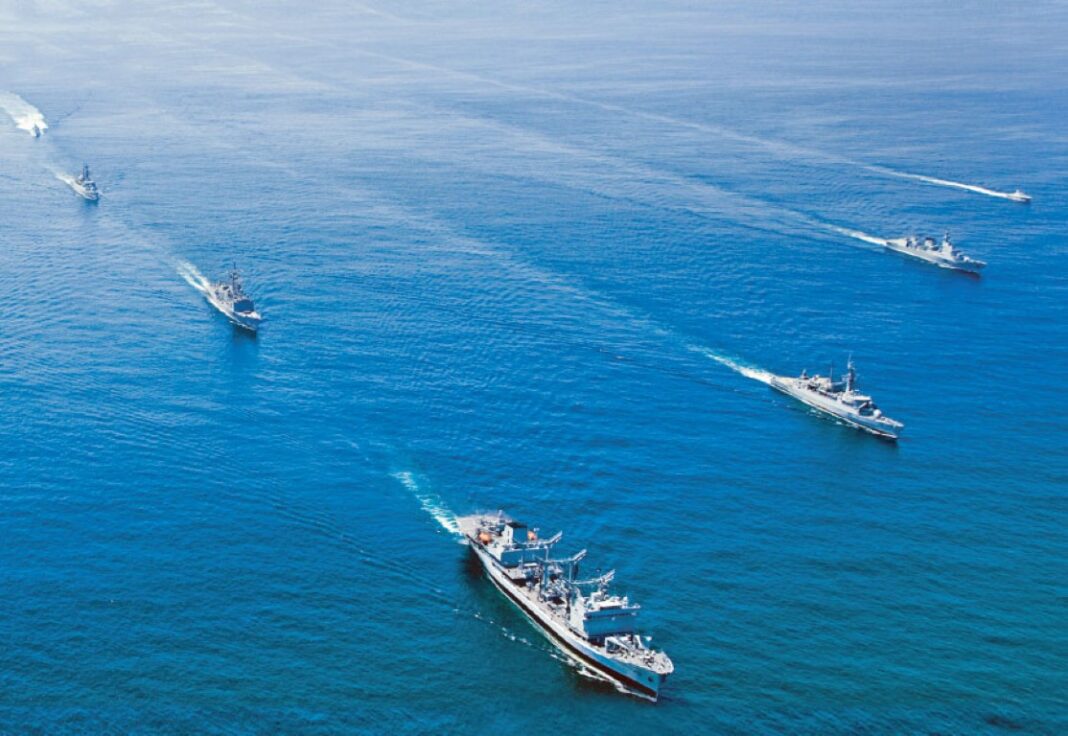By: Sidra Fiaz

This article looks at the security issues Pakistan faces at sea. It discusses how Pakistan’s struggling economy affects its ability to secure maritime areas. It also mentions Gwadar Port, which is important but adds to Pakistan’s security worries, especially for neighboring countries like Iran. Some people think that security problems in Karachi are connected to other countries. They link these problems to the development of Gwadar Port. The study focuses on the security challenges Pakistan deals with. Many countries, including Pakistan, worry about keeping their seas safe. Pakistan has a long coastline and a big area of ocean that it controls.
Many nations, including Pakistan, have serious concerns about maritime security. Pakistan, a coastal nation with a lengthy coastline and a sizable Exclusive Economic Zone (EEZ), is faced with a number of new marine concerns that endanger its security. Piracy, illicit fishing, smuggling, terrorism, and territorial conflicts are only a few of these challenges.
The marine domain of Pakistan is crucial to its economic and geopolitical interests. traffic in the nation is primarily dependent on its ports, and any disruption to marine traffic might have an adverse impact on the nation’s economy. Pakistan’s regional geopolitical landscape further adds to its security problems. The nation is located in a region that struggles with several security issues, including as terrorism, insurgency, and border conflicts.
These elements heighten the importance of Pakistan’s maritime security since the country’s marine space might be used as a transit hub for illegal activity. Thanks to its geographical location, Pakistan is an important factor in the area, making the Indian Ocean a vital maritime route for international trade and energy supplies. However, a number of maritime security issues restrict the nation’s capacity to benefit from its location. The need for strong marine security measures is demonstrated by the fact that Pakistan’s ports and coastline have been repeatedly attacked by terrorist groups.
In addition, illicit fishing is becoming a bigger issue in Pakistani waterways, harming both the economy and the ecology. Smuggling and piracy are other problems that need to be addressed. These difficulties not only affect Pakistan’s economy but also jeopardize the overall security situation in the area.
Given Pakistan’s reliance on its ports for trade and its vital location in a region that confronts several security problems, maritime security in the country is a major topic of concern. Emerging marine issues including piracy, illicit fishing, smuggling, and terrorism pose serious security risks to Pakistan and need to be handled in order to safeguard the nation’s economic and strategic interests. The goal of this writing project is to thoroughly examine these difficulties and provide workable mitigation strategies.
Even though seas are the oceans of resources, they have been considered secure and gave a sense of security to the littoral states, resulting in more focus on the land threats by the states. Nevertheless, technological development and awareness about seas made it a little feared for the states over time. It gave rise to new threats and issues from the marine frontier. Although it is beneficial for the states to have marine borders regarding international trade and economic development, as 90 percent of the world trade is done through sea routes, it has negative aspects too. It urges the rulers to concentrate on maritime security, especially for those having strategic locations in the maritime arena.
Interstate territorial disputes, political instabilities, human trafficking, and smuggling of drugs and arms through sea routes all fall under the banner of maritime security. States globally depend on each other regarding resources and products, which enhances the marine-based issues because the transfer of goods among states is done through sea channels which require assurance regarding the safety and security of the marine sector and sea lanes of communication. The advancement in exploring the sea and its resources gave birth to the tussle, or a type of war among the stars for the sea resources. In a nutshell, the Maritime’s future and security depend on the states’ economies.
So maritime security includes all the issues, either political, economic, military, or scientific, which are directly or indirectly related to the sea. In all these aspects, trade through the sea is a significant concern and the most attention-gaining factor in maritime security for the world at the global level. Over time, more dimensions have been added to the concept, like globalization, depletion of natural resources, and power imbalance, which give rise to asymmetric security.
In recent years, maritime sectors have gained rampant significance in the economy because of their resources. The depletion of resources on land urges the world to look for new resources to fulfill their needs and desires. As a result, sea and oceans became the center of interest for the nations.
The global maritime threats need something more than the ordinary or traditional military to counter them. Because traditionally, the enemies were known, and the plan of action was easy to make and launch, but now the situation is different. In today’s scenario, more attention is paid to policymaking and other diplomatic and confined to maritime steps to answer the non-military threats from the international community. Maritime forces are designed keeping in view the asymmetric environment of this sector.
At the regional level, the Indian Ocean is a mother to security issues. It has several Muslim littoral states and contains some of the world’s essential sea lanes of communication. Like the Strait of Hormuz through which, according to an estimate, almost 17 million barrels of crude oil are passed each day. This led to the enhanced maritime security and stability of the Arabian Sea, as it is a significant concern for the regional and extra-regional powers of the world for their energy flow.
Pakistan is one of those Muslim littoral states with significant concerns regarding the maritime security and stability of the Arabian Sea because of its significantly important geostrategic location. The recent developments in its maritime sector have given rise to security threats as many regional and extra-regional powers do not want Pakistan to be a regional power. The partnership with China is another factor in this whole scenario.
As Alphard Mahan said that
“He who rules the Indian Ocean would rule the world.” (Mahan, 1890, p. 37)
In a nutshell, Pakistan faces many security threats and issues from the oceanfront, including territorial disputes, insurgency, terrorism, and many more. To face these challenges and handle them, Pakistan has to develop a multifaceted policy that should include the agenda of enhancing maritime security, empowering law enforcement agencies, effective management of marine resources, and resolving all kinds of maritime disputes, which also include marine boundary disputes peacefully through mutual understanding among the states.
The writer is a student of International Relations. She can be reached at [email protected]








